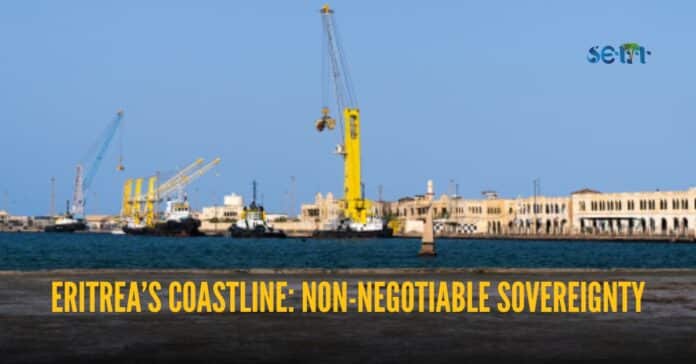Eritrea has firmly rejected renewed rhetoric from Ethiopian political and military leaders pushing for access to the Red Sea, asserting that Eritrea’s sovereignty—particularly over its coastline—is non-negotiable and not subject to historical revision or diplomatic pressure.
The response follows a new campaign led by Ethiopian officials and state-affiliated media. On Saturday, Fana Media Corporation published a report framing Ethiopia’s lack of sea access as a national crisis, tying it to economic growth, security, and generational justice. Scholars cited in the article argued that being landlocked places Ethiopia at a disadvantage and suggested that maritime access should be pursued as a “vital national objective.”
Tensions escalated further when Field Marshal Berhanu Jula, Chief of General Staff of the Ethiopian Army, claimed during a closed meeting that unnamed regional forces are actively working to prevent Ethiopia from reaching the Red Sea. He described this as part of a long-standing effort to isolate the country and limit its strategic influence. He also pointed to what he described as internal political failings by previous Ethiopian governments, particularly the TPLF, which he accused of failing to advance Ethiopia’s maritime ambitions.
Eritrea, however, views these arguments as dangerous and disconnected from international legal norms. Eritrean officials emphasize that their country’s sovereignty—solidified through a 1993 UN-supervised referendum and recognized by international law—includes full and exclusive control over its Red Sea coastline. Any suggestion that this territory should be shared or negotiated is seen in Asmara as an affront to the hard-won independence of the Eritrean people.
Responding to these developments, Eritrean Information Minister Yemane G. Meskel issued a clear and strongly worded statement on social media:
“Repetition ad nauseam of their toxic/elusive agenda aside, the stale arguments that PP officials and trolls are advancing these days increasingly defy simple logic, common sense, as well as elementary (101) principles and norms of international law and diplomacy,” he posted on X (formerly Twitter).
“In this respect, the latest version in town is that they became ‘disillusioned’ in the rapprochement between the two countries when they realized that Eritrea never contemplated, and was not indeed prepared, to partially mortgage or auction its inalienable sovereignty over its maritime assets.”
This response reflects Eritrea’s long-standing position that regional peace and development must be based on mutual respect, sovereign equality, and non-interference. While Eritrea remains committed to regional cooperation and integration, it rejects any notion that its ports are up for negotiation under economic or political pressure.
Some in Ethiopia have interpreted Eritrea’s foreign relations—such as the October 2024 tripartite Horn of Africa security pact with Egypt and Somalia—as exclusionary. Eritrean officials, however, maintain that such partnerships are based on mutual interests, not hostility, and are open to any state that respects sovereignty and regional balance.
As Ethiopia continues to raise its maritime ambitions on the international stage, Eritrea’s position remains unambiguous: sovereignty is not for sale, and the Red Sea is not up for bargaining.

